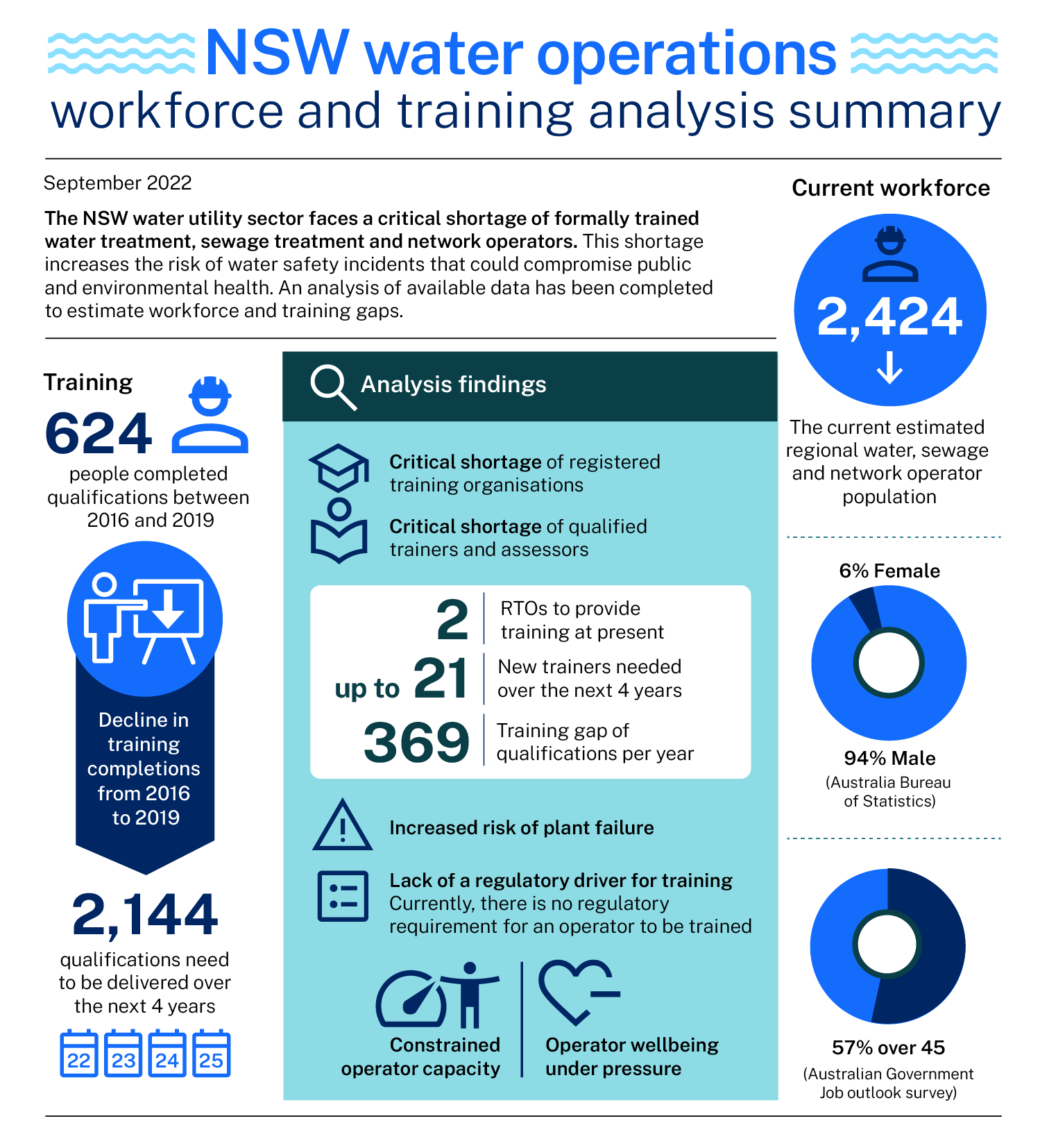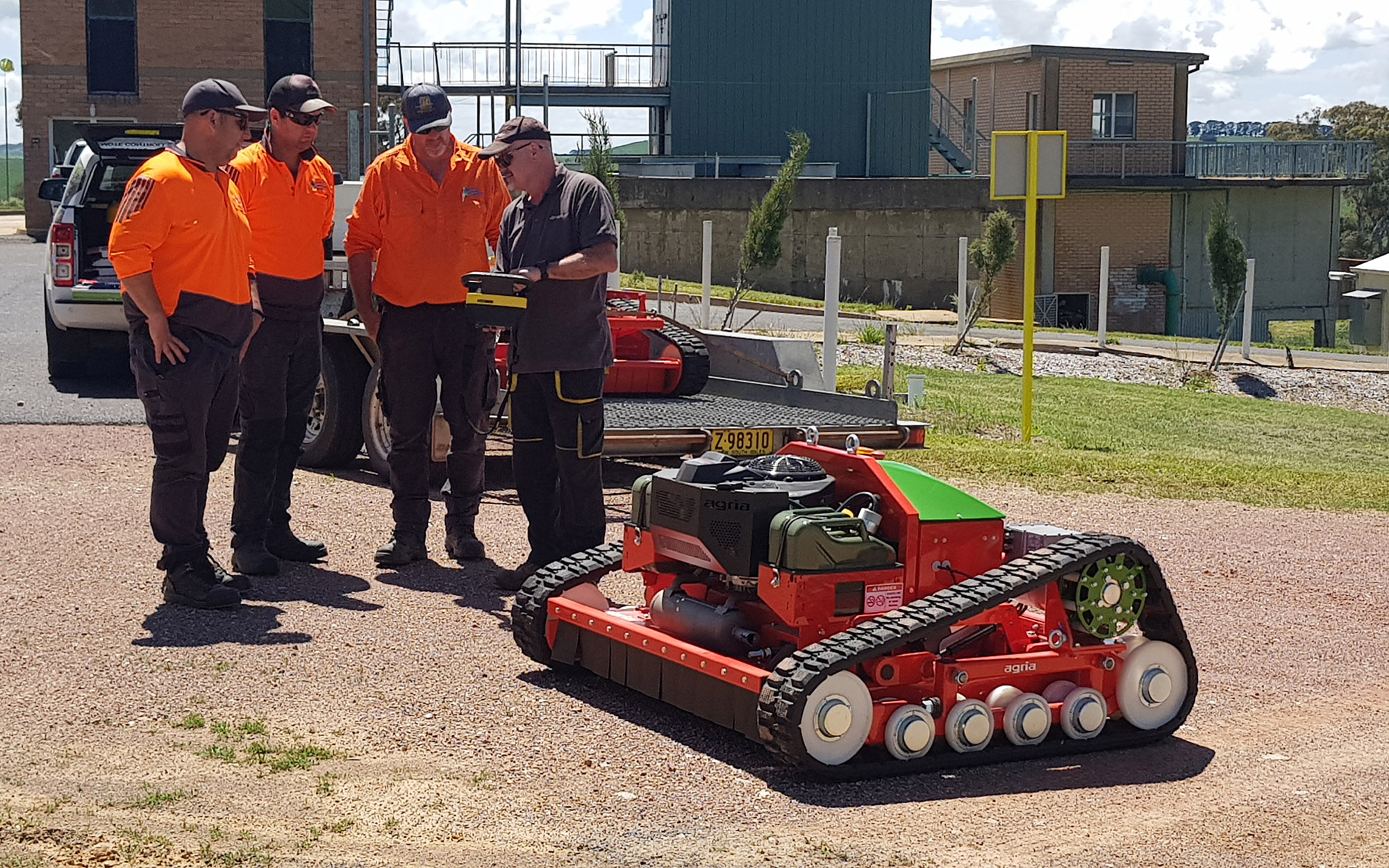Water operators work around the clock at 93 local water utilities to provide water and sewerage services to more than 1.8 million people in regional and rural communities across NSW (outside the areas covered by the Sydney and Hunter Water corporations).
Despite the public health and environmental responsibilities, there are no requirements for water treatment, wastewater treatment or operations staff to have undertaken competency-based training.
NSW is also facing a critical shortage of skilled staff in regional and rural communities.
As part of work to address the skills crisis and staffing shortage, the department has collaborated with local water utilities and the vocational education and training (VET) sectors to develop a competency benchmark and training program for water operators.
Collaboration has led to a consultation paper, Competency benchmark for local water utility operators in NSW PDF, 1593.44 KB, that is now open to feedback from the wider water and training sectors and interested people.
The consultation period is 3 July 2024 to 23 August 2024.
To have your say:
Water workforce composition survey
Help us build a picture of your industry and support future resourcing
Water and sewerage services for regional and rural communities across NSW are provided by 93 local water utilities (LWUs) and the more than 2400 staff they employ.
The sector faces a critical shortage of formally trained water treatment, wastewater treatment and network operators and this increases risk of water safety incidents that could compromise public and environmental health.
To better understand the workforce in NSW LWUs, our Skills and Training team is surveying LWUs about their workforce.
The survey will gather information about staffing, skills and available positions with responses used to help implement targeted strategies to address the job shortage in the water industry.
Because of the level of detail being sought in the Water workforce composition survey, LWUs are being contacted by staff and assisted to participate.
The survey will be undertaken from 31 May to 22 July 2024.
Want to know more or need assistance? Email our team
Workforce and training analysis
Skilled and competent operators are vital to provide essential water and sewerage services in regional NSW and to managing drinking water quality. Currently there is a critical shortage of formally trained water operators in NSW.
To better understand these shortages, the Town Water Risk Reduction Program commissioned an analysis of the NSW water operations workforce and its access to training. A summary report (PDF, 420.89 KB) of the analysis published in September 2022 provides much-needed baseline data for use and further development by the local water utility and training sectors and government partners.

Water operations skills and training action plan
The Town Water Risk Reduction Program is working in partnership with Training Services NSW, the training sector, and the water utility sector to address both training supply and demand challenges.
Action plan
Our water operations skills and training action plan aims to address these challenges to increase skills of existing operators, attract more operators into the sector and increase employment and jobs in regional NSW.
Download the action plan (PDF. 506KB)National approach to water operations training materials
Water utility workforce, skills and training shortages exist across Australia. A major barrier to RTOs supplying training in the water operations training market is the high cost of developing teaching, learning and assessment materials consistent with the National Water Training Package. The draft action plan includes an action to reduce this cost barrier by developing high quality training materials and making them available to all RTOs. In consultation with water and training sector stakeholders, we have set out a case for a national approach to water operations training materials (PDF, 615.91 KB) and are discussing it with state, territory and national governments to gain their support.
Projects and pilots from Phase 1
Water operator training needs assessment for Orana Water Utilities Alliance
We are funding this pilot to support the 11 far west water utilities in the Orana Water Utilities Alliance to identify their training needs across their water business, including catchment or source water provision, water and wastewater treatment and all networks. This will enable each utility to identify the specialist skills and training needed for the utility to reliably provide essential water services to their communities.
The outcomes of the pilot will enable the Alliance to easily identify a training pathway for the critical skills shortages in the Far West region and engage a registered training provider to tailor a program that addresses their specific needs.
As an outcome of this pilot project, resources such as generic professional role descriptions and training and skills required for supervisors, operators, and relief operators, will be made available to all water utilities in regional NSW to assist with workforce planning.
